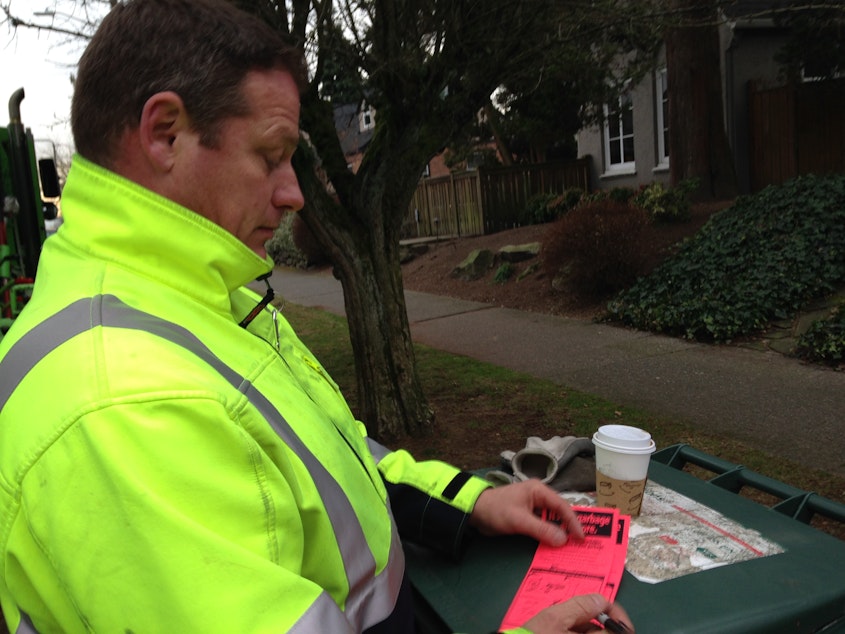Seattle's Scarlet Letter For Sloppy Trash Sorters

Beware the red tag, the scarlet letter of Seattle waste.
The bright red tag says you’ve violated the city’s new trash law, making it illegal to put food into trash cans.
“I’m sure neighbors are going to see these on their other neighbors’ cans,” said Rodney Watkins, a lead driver for Recology CleanScapes, a waste contractor for the city. He’s on the front lines of enforcing these rules.
Seattle is the first city in the nation to fine people for not properly sorting their garbage. The law took effect on Jan. 1 as a bid to keep food out of landfills. Other cities like San Francisco and Vancouver mandate composting, but don’t penalize homeowners directly.
As Watkins made the rounds in Maple Leaf recently, he appeared disheartened to find an entire red velvet cake in someone’s trash bin. Any house with more than 10 percent food in their garbage earned a bright red tag notifying them of the infraction.
Sponsored
“Right now I’m tagging probably every fifth can,” Watkins said. “I don’t know if that’s just the holidays, or the fact that I’m actually paying a lot more attention.”
The new law is also meant to help Seattle increase its recycling and composting rate to 60 percent of all its waste – the city is currently four points below that. Watkins doesn’t have to comb through the trash – the forbidden items are plain to see.
“You can see all the oranges and coffee grounds,” he said raising one lid. “All that makes great compost. You can put that in your compost bin and buy it back next year in a bag and put it in your garden.”
The city currently sends food waste to Cedar Grove and Lenz Enterprises, both in the Puget Sound area, for composting. Later this year PacifiClean, headquartered in Spokane, will take over the share currently composted by Cedar Grove.
Seattle Public Utilities estimates that every family throws away 400 pounds of food each year. The red tags are part of the public education campaign – in July the city will start issuing fines. Single households will pay just $1, but apartments, condos and commercial buildings could be fined $50. That has apartment and condominium dwellers a little nervous.
Sponsored
Jim Ward owns a condo in a large building in Laurelhurst. He said his neighbors include people from many different countries who may not be familiar with Seattle’s rules. Ward came down to the building’s recycling bin recently and it was a mess.
“I found dirty rags with oil on them and just really messy pieces of plastic that were wet,” he said. So Ward took the opportunity to do some outreach.
“I ended up actually taking those things and putting them on the main counter in the lobby of the condominium and I just wrote a note to everyone and I said, ‘Are these things recyclable?’”
Seattle’s push for more recycling comes as the state’s overall recycling rate has gone down slightly. The Washington Department of Ecology said the recycling rate slipped to 49 percent in 2013 from 50, although that’s still among the highest in the nation.
Brett Stav, a spokesman for Seattle Public Utilities, says construction is to blame.
Sponsored
“The state’s and the city’s recycling programs for construction materials isn’t as robust as it is for homeowners,” he said. “When you’re doing a lot of building, a lot of manufacturing, and the economy starts taking off, sometimes the percentage of recyclables in the waste stream lowers rather than increases.”
Brian Neville, a developer and general contractor in Seattle, said the cheapest option is to hire a hauler to take everything away. He has tried sorting materials into bins at the construction site, but it’s expensive. And it’s hard to get people to use the bins properly.
“To do on-site sorting essentially requires that you’re totally committed to doing it, which means either you pay one person to go through and physically sort that stuff on-site, or you go and do it yourself,” he said.
Neville said he often sells off appliances and anything else that can be reused. And if there were more cost-effective options, he would recycle more materials.
“I would do that unless the cost is five times what it costs to have someone just haul it away,” he said. Demolition debris and packaging for building materials are his biggest sources of trash.
Sponsored
Neville said haulers typically take construction waste to facilities where people pluck salvageable materials off a conveyer belt – in contrast, consumer recycling has gone high-tech, with machines to separate paper, glass and plastic.
In July, Seattle will also start issuing fines for too much recycling mixed in the trash –that’s has been illegal for several years, but haulers had just been leaving garbage on the curb when that happened.
So you could get a red tag for that infraction, too.

